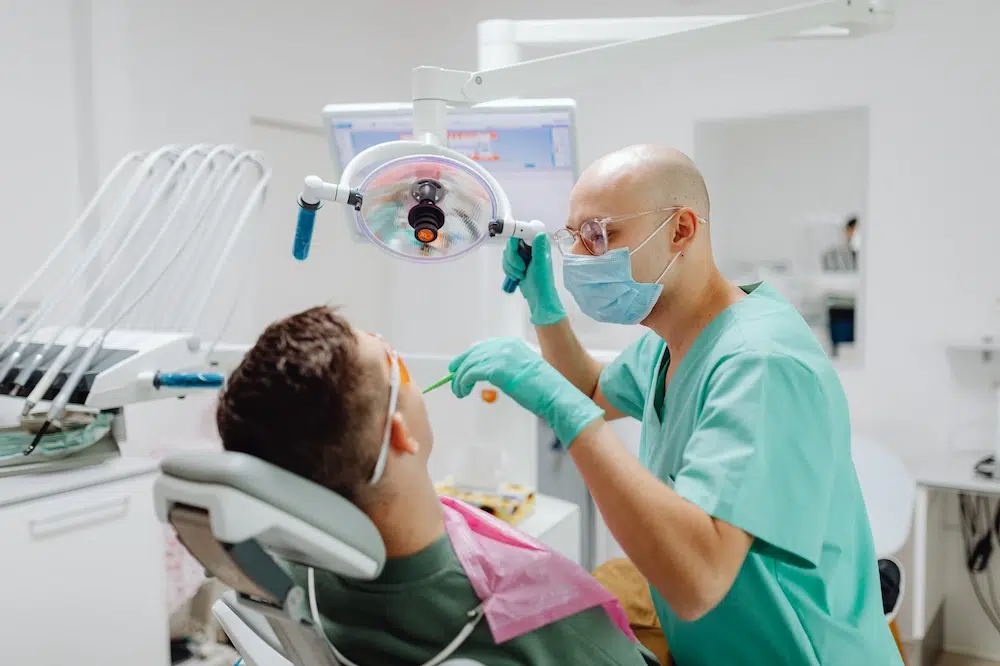
What Is The Role Of Dentist In Treating OSA?
Do you snore loudly? Do you wake up feeling tired even after a full night’s sleep? If so, you may have obstructive sleep apnea (OSA).
OSA is a sleep disorder that occurs when the airway collapses during sleep, restricting airflow and causing breathing to stop and start.
Dentists play an important role in the diagnosis and treatment of OSA. They can identify patients who are at risk for OSA and refer them to a sleep specialist for further evaluation.
Dentists can also create and fit oral appliances that can help to keep the airway open during sleep.
In this article, we will discuss what is the role of dentist in treating OSA. Let’s read on together.
Diagnosing Sleep Apnea
Diagnosing sleep apnea is a key step in improving your sleep and health. This process has three main parts: a sleep study, finding out your risk factors, and teaming up with sleep experts.
Sleep Study And Diagnosis
A sleep study is often the first step if you snore a lot or feel tired after a full night’s sleep. Doctors use machines to monitor your sleep patterns. These tests can happen at a sleep center or at your home.
The study tracks how you breathe, how often you wake up, and the oxygen levels in your blood. The goal is to see if you stop breathing during your sleep.
Identifying Risk Factors
Factors like age, weight, and family history can make you more likely to have sleep apnea. Your doctor will ask you many questions. They might also take some tests.
For example, a neck size greater than 17 inches for men or 16 inches for women can be a risk. When you know your risk factors, you can take steps to lower them.
Collaboration With Sleep Specialists
Once you have a diagnosis, it’s time to work with experts. Sleep specialists can guide you on the best treatment options. They might suggest changes in lifestyle, use of specific devices, or even surgery in extreme cases.
Dental Devices For Sleep Apnea
Dental devices can help if you have sleep apnea. These fit in your mouth while you sleep. They make it easier to breathe. We will talk about three kinds: MADs, TRAs, and custom-fitted oral appliances.
Mandibular Advancement Devices (MADs)
A MAD is a mouth device that moves your lower jaw forward. This opens up your airway, making it easier to breathe. Most people find these devices comfortable. Your dentist will make sure it fits your mouth just right.
Tongue Retaining Appliances (TRAs)
A TRA holds your tongue in place so it won’t block your airway. These devices are useful but might feel odd at first. You will need some time to get used to it. Once you do, it can really help you breathe better at night.
Custom-Fitted Oral Appliances
If MADs and TRAs don’t work for you, custom-fitted oral appliances are another option. Your dentist will make one that fits your mouth perfectly. This option often costs more, but a better fit means better results. It’s a good choice if other options don’t help.
Dental Treatment Process
The dental treatment process is like a roadmap to a healthy smile. It has three main parts: the exam, the plan, and the gear. Let’s dig deep into each one.
Dental Examination and Assessment
The first step in any dental journey is the exam. Your dentist checks your teeth, gums, and mouth.
Think of it as a full check-up for your smile. X-rays often help spot issues we can’t see with our eyes alone. It’s vital. Your dentist figures out what needs fixing and how to do it right.
Treatment Planning And Appliance Selection
Once the exam is done, your dentist drafts a plan. This plan tells you what needs to happen next. Sometimes you’ll need gear like braces or retainers. The plan helps pick the right tools for the job. It’s like a game plan that sets the rules for your dental health journey.
Appliance Fitting And Adjustments
Next up is getting the gear to fit just right. This step is key. If your braces or retainers don’t fit well, they can’t do their job. Your dentist makes sure everything sits as it should. Sometimes, a few visits are needed for small tweaks. These adjustments make sure your treatment works well and fast.
Benefits Of Dental Treatment
A good dental plan does more than just brighten your smile. It can make you sleep better, cut down on noise at night, and even boost your overall health. Let’s explore each benefit.
Improving Breathing And Sleep Quality
Healthy teeth and gums do wonders for your sleep. How? By keeping airways open. This helps you breathe better at night. With better breathing, your sleep quality shoots up. It’s like upgrading from a basic mattress to a top-of-the-line bed.
Reducing Snoring And Sleep Disruptions
Snoring is often a sign of blocked airways. Dental treatment can fix that. Say you get a device to help keep your airways open. That can cut down on the snores and boost the sleep for everyone in the room. It’s a win-win.
Enhancing Overall Health And Well-being
Your mouth is a window to your health. Good dental care lowers risks like heart disease and diabetes. Plus, a bright smile lifts your mood. You feel better and look better. It’s like a health bonus that pays off every day.
Managing Treatment Effectiveness
Managing treatment effectiveness is a top priority in healthcare. It means making sure the care you get works well and keeps you healthy.
Regular Follow-Up And Monitoring
Seeing your doctor often is key. After your first visit, schedule more check-ups. This lets the doctor keep an eye on your health. You get to see if the treatment is working or not. The doctor can use tests and ask you questions. With this info, they can make needed changes to your care plan. Regular visits can catch problems early, and that’s a good thing.
Adjustments And Appliance Maintenance
Treatments often use devices like CPAP machines for sleep apnea or braces for back pain. These need regular care to work well. Dirty or worn-out parts can make them less effective.
So, get these devices checked and cleaned often. Also, if you feel something is off, tell your doctor. They can adjust the settings or replace parts to make sure everything is working as it should.
Collaboration With Sleep Professionals
Some issues, like sleep problems, need special attention. For this, you might see a sleep doctor. Your main doctor and sleep doctor can work together. They share notes and test results.
This helps both doctors make the best plan for you. For example, if you still feel tired during the day, the sleep doctor can find out why. Then both doctors can make changes to your treatment plan.
FAQs
1. How Do Dental Appliances Help Treat Osa?
Dental appliances for OSA move the lower jaw forward. This opens up the airway, making breathing easier during sleep. They are a less invasive option compared to CPAP machines or surgery.
2. What Benefits Do Patients Get From Dental Osa Treatments?
Patients find dental OSA treatments more comfortable and easy to use. These treatments often lead to better sleep, less snoring, and improved daytime alertness, boosting overall quality of life.
Final Words
Dentists play an important role in the diagnosis and treatment of OSA. They can identify patients who are at risk for OSA and refer them to a sleep specialist for further evaluation.
Dentists can also create and fit oral appliances that can help to keep the airway open during sleep.
If you are concerned that you may have OSA, it is important to talk to your dentist. They can help you to determine if you have OSA and discuss the best treatment options for you.
Treatment for OSA can improve your quality of life and reduce your risk of serious health problems.



